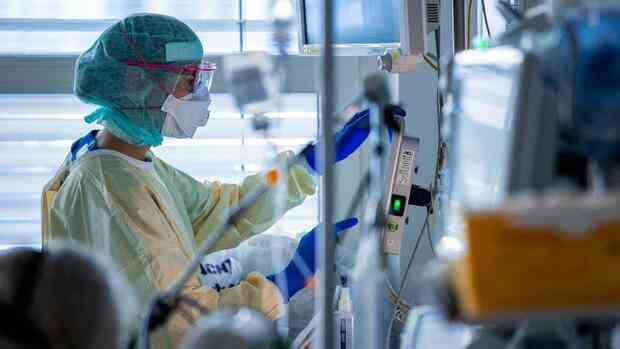Clinics in Germany could also be affected by the bottlenecks in medical products.
(Photo: dpa)
Berlin The warnings from the German medical device companies were also unmistakable in Brussels. For months, the industry has been talking about bottlenecks in numerous medical products that are used in clinics and medical practices.
The reason is the so-called Medical Device Regulation (MDR) – a new approval procedure that manufacturers describe as too complex. For a long time, Brussels calmed the concerns of the manufacturers, but now wants to give in.
The EU Commission held out the prospect of adapting the regulation, which also provided relief for the federal government. “This is a success for the supply,” said Federal Health Minister Karl Lauterbach (SPD) to the Handelsblatt.
The quality of medical products has to be just as good as availability. “Now the Commission must keep its word and present a corresponding proposal at the beginning of next year,” Lauterbach demanded. “Doctors, patients and industry are waiting for it.”
Top jobs of the day
Find the best jobs now and
be notified by email.
On Friday after the meeting of the health ministries of the member states, the EU Commissioner Stella Kyriakides announced that she intended to present concrete changes to the MDR for the beginning of 2023.
Manufacturers welcome announced measures
Among other things, the transition period is to be extended. So far, the procedure has stipulated that existing permits expire in May 2024 at the latest. In addition, it should be possible to extend the validity of products that, according to the EU Commission, pose no risk.
In addition, the sell-off periods should no longer apply. This means that implants that are already stored in a clinic can still be used – even if the certificate is no longer valid.
>> Read here: Medical device manufacturers warn of bottlenecks due to EU regulation
German manufacturers described the announced changes as “substantial”. Marc-Pierre Möll, Managing Director of the Federal Association of Medical Technology (BV-Med), told Handelsblatt: “This is good news for the supply of people with medical products in Germany and Europe.”
The measures could help keep tens of thousands of medical devices and hundreds of companies in the market. Achim Dercks, Deputy General Manager of the Association of German Chambers of Industry and Commerce (DIHK), added that the changes would “give all players more time in view of existing bottlenecks.”
The industry recently felt that Health Minister Lauterbach had let it down on the subject and wrote a fire letter to the European Commission in the summer. There was great concern that medical devices used today might not be re-certified in time.
Stents for babies are threatened with extinction
BVmed announced that the process would take an average of 18 months. The reason is also a bottleneck at the so-called “Notified Bodies”, which carry out the testing and evaluation of the medical devices.
Medical associations also expressed concern that many manufacturers are taking clinically important devices off the market, since the high cost of re-certification is often disproportionate to the sales revenue of older products.
>> Read here: Rising costs and bureaucracy – medical device manufacturers expect less profit
In particular, this could affect special products that are only manufactured in very small numbers to be used in selected cases – in which they are indispensable. Stents for babies, for example, or catheters for stuck heart valves in newborns are such niche products for which there are no alternatives exists when the product is discontinued. This was shown by a survey by the German Chambers of Industry and Commerce (DIHK) and the Spectaris industry association among 378 companies in the industry at the beginning of May.
According to the survey, medical technology companies are already taking numerous products off the market – in 16 of the 21 areas of application surveyed, at least half of the companies active in these areas are eliminating individual products, entire product lines or even entire ranges, such as in orthopedics or classic surgical instruments.
More: Fewer medicines, jobs and investments: the healthcare industry is responding to rising energy costs
